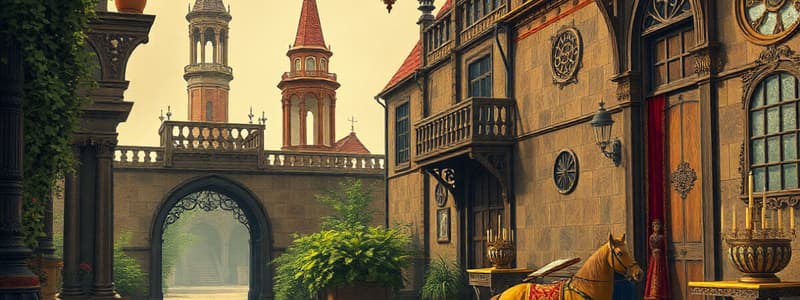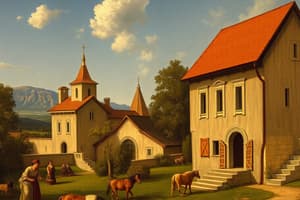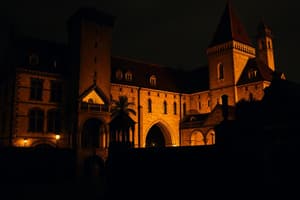Podcast
Questions and Answers
What period marks the beginning of the significant shift in thinking identified as the Italian Renaissance?
What period marks the beginning of the significant shift in thinking identified as the Italian Renaissance?
- 1480-1520 (correct)
- 1520-1550
- 1450-1500
- 1500-1550
Which factor primarily contributed to Italy becoming a focal point for Renaissance thinkers?
Which factor primarily contributed to Italy becoming a focal point for Renaissance thinkers?
- Its isolation from other nations
- The presence of the Roman Catholic Church (correct)
- Its vast agricultural landscape
- Being the first country to adapt the printing press
Which of the following was NOT a characteristic of Renaissance thinkers like Leonardo da Vinci and Galileo Galilei?
Which of the following was NOT a characteristic of Renaissance thinkers like Leonardo da Vinci and Galileo Galilei?
- They sought to balance investigations with religious paranoia
- They considered biology and physics as central studies
- They ventured into classical philosophy
- They aimed to completely dismiss the role of religion (correct)
How did the arrival of individuals from the Byzantine Empire influence the Italian Renaissance?
How did the arrival of individuals from the Byzantine Empire influence the Italian Renaissance?
What aspect of architecture did Renaissance architects strive to achieve?
What aspect of architecture did Renaissance architects strive to achieve?
What was a significant consequence of how Renaissance thinkers approached the Church?
What was a significant consequence of how Renaissance thinkers approached the Church?
Which famous figure from the Renaissance experienced house arrest due to his ideas?
Which famous figure from the Renaissance experienced house arrest due to his ideas?
What motivated Renaissance thinkers more than the centuries that preceded them?
What motivated Renaissance thinkers more than the centuries that preceded them?
Which mindset characterized the analysis of Renaissance thinkers during this period?
Which mindset characterized the analysis of Renaissance thinkers during this period?
What was a significant shift in thinking during the Renaissance compared to the Middle Ages?
What was a significant shift in thinking during the Renaissance compared to the Middle Ages?
Which of the following figures is most famously associated with the Renaissance?
Which of the following figures is most famously associated with the Renaissance?
Which regions of Europe experienced significant changes during the 16th century as a result of the Renaissance?
Which regions of Europe experienced significant changes during the 16th century as a result of the Renaissance?
Historians disagree about the end of the Renaissance; which year do some historians propose as the end?
Historians disagree about the end of the Renaissance; which year do some historians propose as the end?
What is generally meant when people refer to the Renaissance?
What is generally meant when people refer to the Renaissance?
What characterized the mindset of the Middle Ages that changed after the Renaissance?
What characterized the mindset of the Middle Ages that changed after the Renaissance?
Which factor contributed significantly to the end of the Middle Ages and the start of the Renaissance?
Which factor contributed significantly to the end of the Middle Ages and the start of the Renaissance?
What major movement followed the Renaissance, leading to further social and political upheaval?
What major movement followed the Renaissance, leading to further social and political upheaval?
Which statement accurately reflects the impact of the Renaissance on Western thinking?
Which statement accurately reflects the impact of the Renaissance on Western thinking?
How did agriculture improvements impact the onset of the Renaissance?
How did agriculture improvements impact the onset of the Renaissance?
Which of the following events is characterized as intensifying after the Renaissance?
Which of the following events is characterized as intensifying after the Renaissance?
What invention by Johannes Gutenberg had a profound impact on the Renaissance?
What invention by Johannes Gutenberg had a profound impact on the Renaissance?
How did the Renaissance influence the Americas?
How did the Renaissance influence the Americas?
Which of the following was NOT a consequence of the population changes leading to the Renaissance?
Which of the following was NOT a consequence of the population changes leading to the Renaissance?
What characterized the mindset transition from the Middle Ages to the Renaissance?
What characterized the mindset transition from the Middle Ages to the Renaissance?
When did the European world begin to move away from the authority of the Catholic Church?
When did the European world begin to move away from the authority of the Catholic Church?
Which event significantly increased the accessibility of books and knowledge during the Renaissance?
Which event significantly increased the accessibility of books and knowledge during the Renaissance?
What was one effect of the Great Famine and the Black Death on Europe prior to the Renaissance?
What was one effect of the Great Famine and the Black Death on Europe prior to the Renaissance?
What was a critical change in thought processes during the Renaissance compared to the Middle Ages?
What was a critical change in thought processes during the Renaissance compared to the Middle Ages?
Which of the following accurately describes the relationship between the Renaissance and the decline of the Church's power?
Which of the following accurately describes the relationship between the Renaissance and the decline of the Church's power?
Flashcards
Italian Renaissance
Italian Renaissance
A cultural movement in Italy from 1480 to 1520 that marked a shift in thinking.
Byzantine Influence
Byzantine Influence
Ideas and culture from the Byzantine Empire that revived during the Renaissance.
Leonardo da Vinci
Leonardo da Vinci
A key figure in the Renaissance known for his contributions to art and science.
Galileo Galilei
Galileo Galilei
Signup and view all the flashcards
Impact of Catholic Church
Impact of Catholic Church
Signup and view all the flashcards
Classical Architecture
Classical Architecture
Signup and view all the flashcards
Renaissance Thinkers
Renaissance Thinkers
Signup and view all the flashcards
Port Cities
Port Cities
Signup and view all the flashcards
Philosophical Shift
Philosophical Shift
Signup and view all the flashcards
Empirical Investigation
Empirical Investigation
Signup and view all the flashcards
Renaissance
Renaissance
Signup and view all the flashcards
Dark Ages
Dark Ages
Signup and view all the flashcards
Shift in Thinking
Shift in Thinking
Signup and view all the flashcards
Northern Renaissance
Northern Renaissance
Signup and view all the flashcards
William Shakespeare
William Shakespeare
Signup and view all the flashcards
Catholic Church Authority
Catholic Church Authority
Signup and view all the flashcards
End of the Renaissance
End of the Renaissance
Signup and view all the flashcards
Enlightenment
Enlightenment
Signup and view all the flashcards
Protestant Reformation
Protestant Reformation
Signup and view all the flashcards
Industrial Revolution
Industrial Revolution
Signup and view all the flashcards
Transition from Middle Ages
Transition from Middle Ages
Signup and view all the flashcards
Decline of Church Power
Decline of Church Power
Signup and view all the flashcards
Great Famine
Great Famine
Signup and view all the flashcards
Black Death
Black Death
Signup and view all the flashcards
Agricultural Improvements
Agricultural Improvements
Signup and view all the flashcards
Johannes Gutenberg
Johannes Gutenberg
Signup and view all the flashcards
Printing Press Impact
Printing Press Impact
Signup and view all the flashcards
Quarantine Effectiveness
Quarantine Effectiveness
Signup and view all the flashcards
Renaissance Ideas
Renaissance Ideas
Signup and view all the flashcards
Study Notes
The Renaissance
- The Renaissance generally refers to multiple phases of change across Europe, not just Italy.
- Each nation had its own period of transition from the Middle Ages to the Early Modern Era.
- The Renaissance is considered the turning point marking the end of the Middle Ages, although there's no single definitive date.
- Estimates suggest roughly 100 years of transition from the Middle Ages.
- The Renaissance marked a significant shift in thought processes and focus compared to the Middle Ages.
- The Middle Ages emphasized the importance of Christianity and Roman Catholic teachings.
- The corruption and consolidated power within the Church became prominent during the Renaissance.
- With the decline of the Church's power, scientific and philosophical advancements emerged.
- Scientific innovations, like the printing press, played a major role in the spread of ideas and contributed to the Renaissance.
Prelude to the Renaissance
- The Middle Ages, despite not prioritizing science, saw several significant world-changing inventions.
- The Great Famine and the Black Death greatly reduced the European population.
- Improved farming techniques led to more consistent food production and climate changes were less devastating.
- Quarantines proved effective in controlling the spread of plague in major towns.
- The improvements in agriculture and disease management contributed to easier survival.
- Johannes Gutenberg's printing press made books more accessible, a key factor in the spread of ideas and knowledge beyond agriculture.
- The boom in ideas and thoughts led to the Renaissance.
Italian Renaissance
- The first major shift in thinking occurred in Italy around 1480-1520.
- Italy's location as the center of the Roman Catholic Church attracted prominent minds and thinkers globally.
- Major port cities brought ideas and great thinkers from different global regions.
- Arrival of thinkers from the Byzantine Empire that were fleeing Constantinople's fall, further contributed to the renewal of ideas in Western Europe.
- Renowned individuals like Leonardo da Vinci and Galileo Galilei combined scientific inquiry with their religious understanding, despite religious objections.
- Renaissance thinkers re-evaluated and explored more classical structures and ideals.
The Renaissance Spreads
- Italy was initially the epicenter of the Renaissance's transformative thinking.
- The shift extended to other European countries like France and England.
- Significant developments occurred in these areas like politics and the arts, alongside other cultural achievements.
- William Shakespeare, amongst many others, left indelible marks on their nation.
- Renaissance ideas dispersed farther into areas like the Americas, impacting colonies.
The Renaissance Fades
- Historians debate the precise end date of the Renaissance.
- Some cite the year 1520, when the major figures and enthusiasm were gone.
- Others posit 1620, when the spirit of renewal and new ideas dwindled across the continent.
The End of the Renaissance
- Western thinking transitioned away from the blind faith of the Middle Ages.
- Increased education and spread of ideas occurred due to inventions and developments.
- The scientific method emerged as a prominent source of understanding, alongside traditional faith.
- Scientific discoveries, like the industrial revolution, although impactful, created negative global consequences like pollution that have continued until today.
Studying That Suits You
Use AI to generate personalized quizzes and flashcards to suit your learning preferences.




